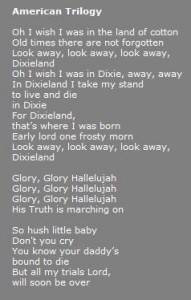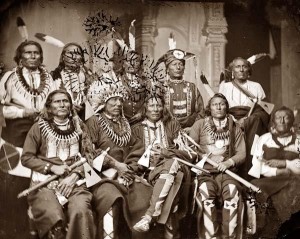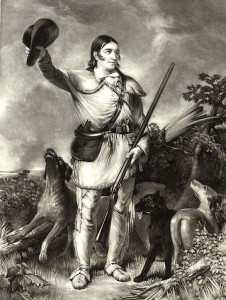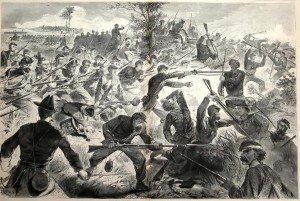“Quite simply, a Trilogy is a salute in honour of war dead. All war dead. Many clubs have their own version of the Trilogy (there is no definitive ‘right’ version) usually performed at the end of the evening concluding with a gun salute.
Throughout, the meaning is the same – to salute those of all flags and nations who have given their lives in war. Where possible, we in Scotland perform two different Trilogies – the Mexican and the American.
The first Trilogy to be performed, the Mexican, is dedicated to those who perished in the battle of the Alamo in February 1836. Approximately 190 men, women and children defended the Alamo mission in San Antonio, Texas, against an army of 8,000 men led by General Santa Anna. No quarter was asked or given, and just prior to the final onslaught, a bugler sounded the “Deguello” that confirmed no prisoners would be taken.
Famous names such as Davy Crockett, Jim Bowie, William Travis, and a Scottish piper, John McGregor, perished along with the rest of their company. They inflicted some 2,000 casualties on the Mexicans, dead and wounded, during the 13-day siege, and their sacrifice gave Sam Houston time to raise enough men to defeat General Santa Anna at a later date.
Due to the bravery shown by those defenders, it is said that Santa Anna commissioned his bugler to compose a Trumpet Voluntary on the field of battle as a salute to the dead on both sides. Legend says that he ordered silence, on pain of death if it were broken, and the Mexican flag be waved in ceremony. Today that Trumpet Voluntary is known as “Il Silencio” (in silence) and the Mexican Trilogy is performed to that dirge, in silence, with a flag waving display that depicts the ebb and flow of the battle. Where possible, this Trilogy is performed before the American Trilogy, as the events that influenced it happened prior to that other great act of war, the American Civil War, which of course influences the American Trilogy.
In 1861, the American Civil War began and raged through the land for four years. All war is folly but this one set family against family, brother against brother, and worst of all, American against American. Almost 620,000 people lost their lives during this tortuous time, which equates to two per cent of the total population of the country. No conflict before, or since, has taken such a high toll of a single population. We dedicate the American Trilogy as a salute in memory of all those men and women lost from both sides.
During the Civil War, the ladies of both sides who had been left at home, along with some older male members of the community, held ceremonies. This was either to mourn lost ones or pray for those still at battle. Battle flags or ‘colours’ would be displayed and either the North or the South’s flag folded. Then, as now, the folded flag was either tucked in when presented due to a death, or left open, to be unfolded at a later date as a general salute.
Ladies still take the leading roles in the American Trilogy, e.g. as the folding party, led by a Gun Marshall. This individual would have been one of the older men who had not gone to the battlefield, or a minister of the cloth. As we perform a general salute in our club, the flag we fold is left open. Both armies in that conflict had battle hymns – “I Wish I Was in Dixie” for the south and “Glory Glory Hallelujah” for the north. Elvis Presley represented both hymns, as well as a general prayer for all war dead which was common to both sides, “Hush Little Baby“, in his famous hit, “American Trilogy”. This tune has therefore been adopted for the American Trilogy ceremony, which takes the form of a more traditional salute that encompasses both a flag folding ceremony and a number of shots fired in tribute. This is usually one for the North, one for the South, and one for Fallen Friends or Lost Souls. Depending on whether there are representatives of the Mexican Empire or Native American nations on the floor, tribute would also be made to their dead to remember them. Although military in style, it is not a funeral. This being the case, varying amounts of dedicated shots may be fired, depending on the particular venue the Trilogy is being held and those holding it.
Both armies in that conflict had battle hymns – “I Wish I Was in Dixie” for the south and “Glory Glory Hallelujah” for the north. Elvis Presley represented both hymns, as well as a general prayer for all war dead which was common to both sides, “Hush Little Baby“, in his famous hit, “American Trilogy”. This tune has therefore been adopted for the American Trilogy ceremony, which takes the form of a more traditional salute that encompasses both a flag folding ceremony and a number of shots fired in tribute. This is usually one for the North, one for the South, and one for Fallen Friends or Lost Souls. Depending on whether there are representatives of the Mexican Empire or Native American nations on the floor, tribute would also be made to their dead to remember them. Although military in style, it is not a funeral. This being the case, varying amounts of dedicated shots may be fired, depending on the particular venue the Trilogy is being held and those holding it.
As the Southern states lost the war, and due to the fact that this part of America supplied us then, as now, with most of the trends that influence our music, dress and dance, it is the Southern flag (often called the Confederate Battle flag) which is folded. This flag has now been removed from the Opry, following a ballot of members.’ and can no longer be used in the Trilogy ceremony.
Ceremonies along the lines of above have been carried out for many years and in all sorts of forms, but it is only when the song “American Trilogy” was originally brought out (before Elvis made it famous), that a flag folding ceremony was able to be performed on a regular basis and under controlled conditions. One who knows how, and when, to fold the flag will pass this on to other like minded individuals so that the flag is always folded the same way at the same time. It was also at this time that these ceremonies started to be called a Trilogy, after the song. Until that time it had always been known as a general salute and no music was played.
There is one more Trilogy, which is not performed very often, as it is very specialised. This is the Native American Trilogy, dedicated to the five million Native Americans who died at the hands of the white man, from their first encounters until the Battle of Wounded Knee in 1890. This is a very moving ceremony, and rightly so considering the tragedy it is based on. Nowadays, the word Trilogy stands for all these ceremonies – Native American, Mexican, and American – to salute all war dead, not just as some people think, American. Westerners carry out these ceremonies, although all are welcome on the floor after the standard bearers, gunfighters and flag folding party have taken their place. The presiding Gun Marshall will usually announce this and welcome everyone on to the floor.
Country and Western clubs have always been known for their generosity to charities and those less fortunate, as well as remembering the dead. The whole country remembers war dead on Armistice Day – we try to remember them every time we meet. We hope you will join us”.
Eddie Cairns, AKA Doc Holliday
| Top of Page | | What’s On | | Contact Us |

